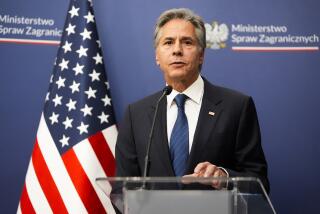Changes Seem to Ensure Gorbachev’s Grip on TV, Radio : Soviet Union: Control of broadcasting is given to autonomous agency with wide powers. Conservative who censored radical programs will head it.
MOSCOW — President Mikhail S. Gorbachev on Friday ordered the reorganization of Soviet broadcasting, transforming the governmental committee that has run radio and television into an autonomous, state-owned corporation. He named a politically conservative news executive as its chairman.
Although the move is part of the general decentralization under way here as a result of broad political and economic changes, its form appeared to ensure that Gorbachev will retain direct control of the broadcast media through his appointment of the corporation’s chairman, who will have broad powers.
Gorbachev immediately appointed Leonid P. Kravchenko, who has been the chairman of the State Committee for Television and Radio, to head the corporation--despite widespread criticism of his conservative policies and his recent censorship of radical programming.
As now planned, the reorganization would give the corporation chairman greater powers, allowing him to make many more decisions on his own authority, freeing him from supervision by Communist Party officials and members of Parliament and leaving him responsible only to the president.
According to Soviet journalists, this will ensure stronger controls over programming than there have been in recent years, and there are fears that Kravchenko will use that authority to end what little critical reporting survives on national radio and television.
Last week, Kravchenko took liberal Radio Rossiya off the major frequencies it had been using, depriving it of half of its audience. The station belongs to the Russian Federation, the country’s largest republic, and reflects the views of Boris N. Yeltsin, the head of the Russian republic. It had been highly critical of the central government’s policies in the Baltic republics.
Yeltsin accused Kravchenko this week of refusing to grant him uncensored television time to respond to official attacks against him for his support of the Baltic republics in their campaign for independence from the Soviet Union.
Earlier, Kravchenko had suspended the broadcasts of the country’s most popular television program, “Vzglyad,” whose tough reporting on current affairs drew an audience estimated at 185 million each weekend. It had wanted to investigate the resignation of Foreign Minister Eduard A. Shevardnadze in December.
Kravchenko, the former director of the official news agency Tass, argued without apology at a national journalists’ meeting this week that the state media, including radio and television, must reflect the views of the president and of the government. His policies, he asserted, were aimed at ensuring that television and radio act responsibly during the country’s prolonged economic, ethnic and political crises.
Kravchenko was also appointed chairman of a new radio and television council that will coordinate national broadcasting and help the country’s constituent republics develop their own programming and facilities.
In his decree, Gorbachev allowed the new corporation to retain its foreign currency earnings, which are rapidly increasing as Western television companies use Soviet facilities. The old committee had turned its revenues over to the state, but the decree exempts the new corporation from the general requirement that it sell the dollars it earns to the State Bank.
And, because it is no longer effectively a government ministry but a public corporation, the new body will be freed from state regulations on wages, and Soviet journalists expect Kravchenko to grant substantial raises in an effort to reduce tensions.
In a second decree, Gorbachev ordered the government to draw up plans for tending the graves of Soviet soldiers killed in war and other conflicts and protecting monuments to them. He called for prosecution of those responsible for vandalism at the graves or the monuments. The decree appeared to be a further response to conservatives angered by “disloyalty,” particularly in the Baltic republics of Estonia, Latvia and Lithuania.
More to Read
Sign up for Essential California
The most important California stories and recommendations in your inbox every morning.
You may occasionally receive promotional content from the Los Angeles Times.










